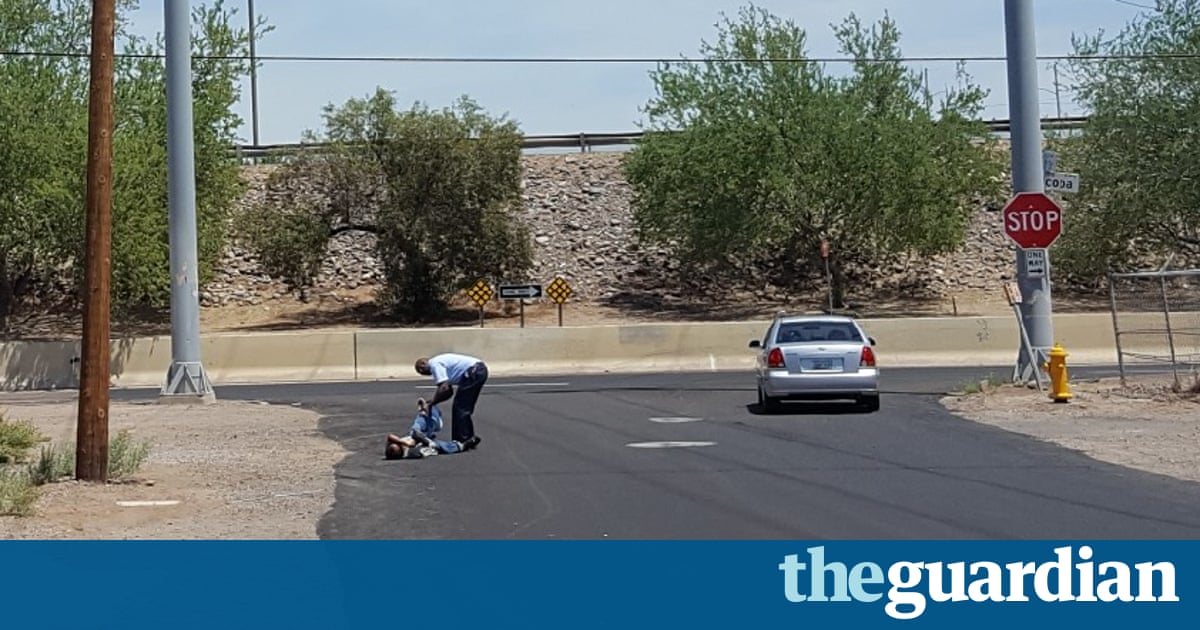Those living outside in Phoenix are most vulnerable to the dangerous and possibly deadly effects of a scorching heatwave swallowing the south-west

The man was not wearing any shoes, and he was crawling along the baking asphalt with socks on his hands.
That was how David Lee Witherspoon Jr, president of a food pantry, found him while driving through Phoenix last week. The man told Witherspoon he had left his home without any footwear after a fight, though Witherspoon thought he might have been homeless. Then he had taken off his socks to remove some burrs, but the road surface was so scorching he was forced onto all fours. Luckily Witherspoon had some spare sneakers in his car, and helped the man put them on.
Anyone crawling along the street when its over 100 degrees you would not survive very long before you got third-degree blisters on your hands and even your knees, Witherspoon said.
It is currently so hot in Arizona that just inhaling can feel painful. Dozens of flights have been canceled at the Phoenix airport. The National Weather Service has declared an excessive heat warning that will be in place until Monday, amid temperatures approaching 120F.
Yet the swelter is, for the majority of people, mostly avoidable thanks to air conditioning. For those living under bridges and in tents, however, it is suffocating and inescapable. Eventually, it could be fatal.
Almost 6,000 homeless people were counted in the Phoenix region during a one-day census last year. Of those without shelter, a number gather a few miles west of downtown, where there are few trees, dirt lots, and roads littered with trash. On Thursday, a 21-year-old man named Jonathan Olvera and his girlfriend, who declined to give her name, were sitting on a shaded sidewalk.
All this week its been hot, he said, wearily. His girlfriends cheeks were red from the sun; he looked more severely burned. Both were fatigued, with dry lips.
On the ground next to them were their backpacks and a few empty water bottles. We try to drink as much water as we can, Olvera said. We put cold water on our heads or carry rags that we keep wet.
Katrina Giddings, 35, said she had spent the previous night, when temperatures were in the high 90s, bedded down on some concrete. It was a terrible night, she said. I kept waking up every hour just to drink some water and to get my hair wet.
According to the National Weather Service, when the air temperature is 102F and the sun is shining, blacktop can be heated to as much as 167F. That is hot enough to fry an egg or cook ground beef, though more worryingly, the weather service also notes that in such conditions, human skin is instantly destroyed. Pets paws are also vulnerable and it is common for homeless people to have dogs.
Phoenicians might fancy themselves accustomed to climatic extremes, though this week even they have been surprised: temperature records have been surpassed two days in a row.
To help people living on the streets, the Phoenix Rescue Mission has volunteers passing out water, sunscreen, hats, bandanas and towels soaked with cold water. A few beneficiaries dont realize how dangerous the conditions are.
Every year, theres someone who is flat-out sleeping in the middle of the daytime uncovered, unsheltered and at risk of heat exhaustion, said spokesman Nathan Smith.
And some organizations have been giving out items that seem bizarre: blankets. But there is good reason. The sidewalks dont necessarily cool all the way down at night, and the blankets are a barrier.
Meanwhile, cooling centers have been set up around the city, and demand for indoor shelter is high. On Thursday, close to 100 homeless people packed the Lodestar Day Resource Center in downtown Phoenix. Some were drenched in sweat and their skin was tomato-red, while others sat and laid their heads on round tables trying to sleep.
One of the main shelters downtown is now opening its doors earlier at 1.30pm rather than 3pm so people can escape the afternoon highs. It is running low on bottled water, said spokesman David Smith, as well as beds. Even though the shelter can hold almost 500 people, there is no room left.
There have been five heat-related deaths in Maricopa County, where Phoenix is located, so far this year, according to health officials. They said they were unable to confirm whether the deceased were homeless.
Speaking by phone on Thursday, Witherspoon, a devout man whose food pantry is operated by the Society of St Vincent de Paul voluntary organization, explained how a homeless person could get into a dangerous cycle.
Right now its 9 oclock at night, he said. Its still over 100 degrees. The only difference is theres no sun, but the heat is still there, so if youre not drinking water youre dehydrating. If you dehydrate overnight and then you get up in the morning and the sun comes up, and you do that for a couple of days, it doesnt take long before you cant function.
As for the stranger he encountered on the street, Witherspoon had little to say. The man appeared impoverished and had facial hair. Witherspoons size 10 tennis shoes fit him. After the man got up, Witherspoon told him he could get help at a shelter, and went to move his car, which was blocking the street.
But then it was as if it were all a mirage in a superheated desert.
I turned around, Witherspoon said, and hed vanished.
Alastair Gee contributed reporting
Sign up for our monthly newsletter on homelessness in the US
Read more: www.theguardian.com








![[Video] How to get rid of bed bugs in Toronto](https://www.thehowtozone.com/wp-content/uploads/2019/10/maxresdefault-2-100x70.jpg)


